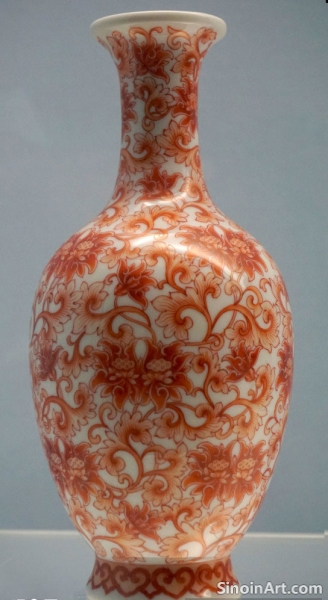Yuan Ceramics and the Use of "Copper Red" (Revisited)
|
We touched on underglaze red earlier, but a deeper look at the specific use of copper red during the Yuan is valuable. The use of copper to achieve red tones in underglaze decoration was one of the most technically challenging techniques mastered by Yuan Dynasty potters, and the difficulty in the production of this colour makes surviving examples of Yuan period red pottery especially valuable.  The application of copper-based pigments to create red designs under a transparent glaze required precise control of the firing conditions, as any slight variation in temperature or kiln atmosphere could result in unwanted results. The difficulty of controlling the firing process meant that red underglaze pieces were often highly prized.  The range of red tones achieved using copper, from vibrant scarlet to soft pinkish hues, demonstrates the range and versatility of this technique, and the variability of the red tones from piece to piece makes each one highly unique and valuable.  Yuan Dynasty ceramics with underglaze red designs are particularly rare and highly prized by collectors, and surviving examples of this type of pottery are considered to be especially valuable pieces of Chinese art. The technical complexity and beauty of underglaze red designs on Yuan ceramics is a testament to the skill and experimental nature of potters during this period.
|
Tag : Yuan copper red, Chinese underglaze, red pottery, ancient glaze, rare ceramics
Related information
- The Materials Used in the Creation of Yuan Dynasty Porcelain
- Yuan Ceramics and the Production of "Shufu" Wares
- Future Directions in Yuan Dynasty Porcelain Research: New Discoveries and Interpretations
- The Influence of Yuan Dynasty Porcelain on Contemporary Artists
- The Rise of Blue and White: Yuan Dynasty Porcelain's Groundbreaking Innovation
This article details the materials used in creating Yuan Dynasty porcelain, including kaolin clay, feldspar-based glazes, and imported cobalt, explaining how each contributed to the unique characteristics of the final pieces.
"Shufu" wares, produced in Jingdezhen during the Yuan Dynasty, are known for their delicate white porcelain, often with subtle underglaze decorations in a pale blue or creamy white. These pieces were often made for the Imperial court or for other high-ranking officials and scholars and they demonstrate the continued importance of high quality white porcelain.
This article discusses future directions in Yuan Dynasty porcelain research, including new archaeological discoveries, advances in scientific analysis, and the potential for more detailed cross-cultural studies, promising to further enrich our understanding of the era.
This article explores the influence of Yuan Dynasty porcelain on contemporary artists, highlighting its impact on ceramic design, use of underglaze blue, and the integration of traditional techniques with modern artistic approaches.
The Yuan Dynasty (1271-1368) witnessed the groundbreaking introduction of blue and white porcelain. This article explores its robust forms, innovative designs, and lasting global impact, highlighting its revolutionary significance in the history of ceramics.